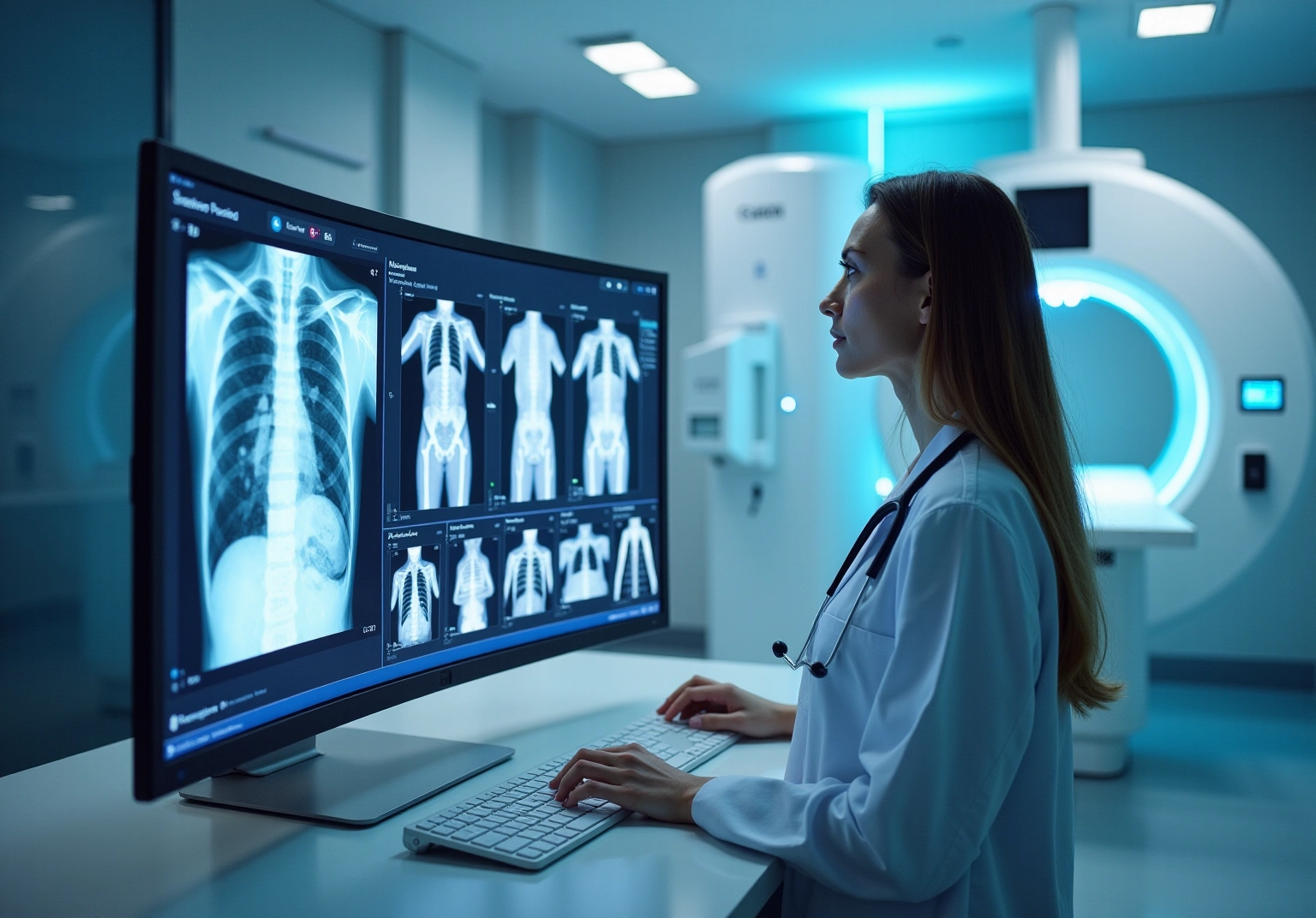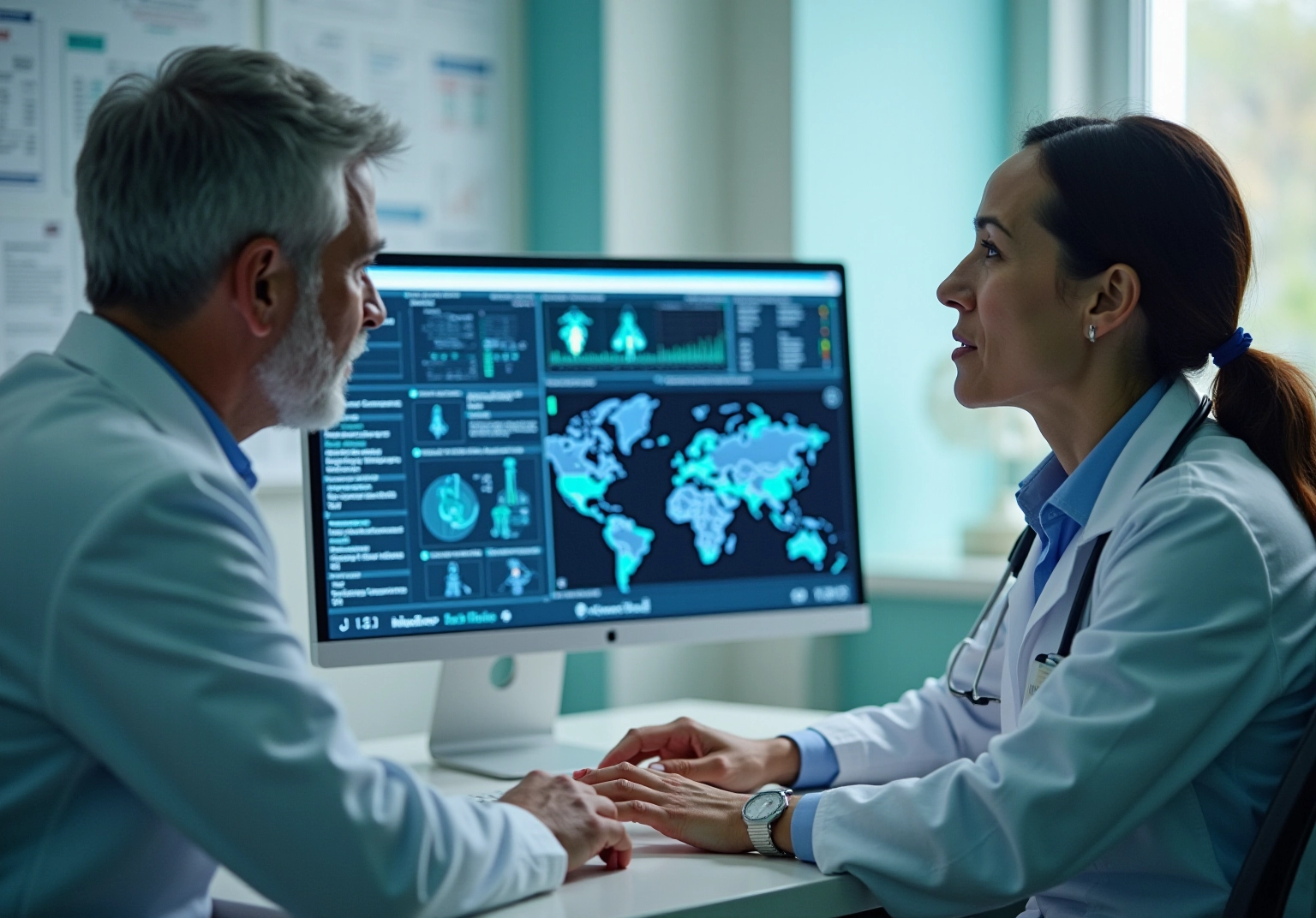
The article “10 AI in Healthcare Examples Transforming Patient Care Today” captures attention by exploring the transformative impact of artificial intelligence on patient care within various healthcare domains. It presents compelling examples, such as AI-driven diagnostic tools and personalized treatment plans, illustrating how these innovations address critical challenges in the industry. By significantly improving diagnostic accuracy, streamlining workflows, and enhancing patient engagement, these technologies not only solve pressing issues but also elevate the overall healthcare experience. The insights provided demonstrate the potential of AI to revolutionize patient care, prompting stakeholders to consider these advancements as essential components of modern healthcare solutions.
In the rapidly evolving landscape of healthcare, artificial intelligence (AI) stands out as a transformative force, fundamentally reshaping the delivery of patient care across various domains. By streamlining coding processes and enhancing diagnostic accuracy, AI technologies are not only boosting operational efficiencies but also allowing healthcare providers to concentrate on what truly matters—patient well-being.
As organizations increasingly embrace these advanced solutions, the potential for AI to revolutionize healthcare becomes clear, promising significant enhancements in patient outcomes and the overall quality of care. This article explores the innovative applications of AI in healthcare, spotlighting key players and their contributions to making healthcare more efficient, accessible, and effective.
The Inferscience HCC Assistant harnesses advanced AI algorithms to automate the collection and analysis of clinical data, providing real-time coding suggestions right at the point of care. This innovative solution not only streamlines the HCC coding process but also significantly boosts providers’ Risk Adjustment Factor (RAF) scores, ensuring they secure appropriate funding from Medicare Advantage contracts.
By alleviating the administrative burdens typically faced by coders, the HCC Assistant empowers medical professionals to dedicate more attention to patient care, thereby enhancing the overall quality of services delivered. This serves as one of the notable AI in healthcare examples, particularly in achieving remarkable improvements in HCC coding accuracy, with some reports indicating enhancements of up to 30%.
Moreover, when integrated with Electronic Health Record (EHR) systems, AI in healthcare examples can automatically extract pertinent information, pre-fill coding fields, and flag records for human review, leading to reduced manual data entry and enhanced workflow efficiency.
Real-world applications of AI in healthcare examples, such as the HCC Assistant, illustrate its effectiveness in identifying at-risk members earlier, a critical aspect as personalized medicine continues to evolve. As David Short astutely noted, this capability enhances care for individuals by enabling service providers to focus on delivering quality offerings while maximizing their funding potential.
With a steadfast commitment to data security, evidenced by its SOC2 Type II certification, Inferscience positions itself as a trusted partner in the medical field, dedicated to improving coding accuracy and efficiency through cutting-edge AI solutions.

Inferscience harnesses the power of AI and natural language processing (NLP) to meticulously analyze individual data, including medical records and clinical studies, generating actionable insights that inform treatment decisions. By utilizing sophisticated machine learning algorithms, Inferscience’s solutions consolidate individual data in one location, thereby improving HCC coding efficiency and precision for medical providers. This data-driven methodology not only enhances the quality of patient care but also assists medical organizations in streamlining risk adjustment workflows, optimizing Medicare Advantage funding, and ensuring compliance with regulatory standards.
As the Keragon Team emphasizes, “The next few years will be crucial in answering that…” This statement underscores the urgency for medical organizations to adopt AI solutions like those provided by Inferscience. Recent statistics reveal that only 25% of medical executives had implemented generative AI solutions as of December 2023, indicating a significant opportunity for growth in this area. Moreover, a substantial 83% of doctors believe that AI could play a pivotal role in alleviating administrative pressures and minimizing burnout within the medical field. By incorporating AI in healthcare examples alongside NLP, organizations can not only enhance healthcare outcomes but also improve operational efficiency, creating a compelling case for CFOs to regard these investments as a strategic priority.
As organizations progressively recognize the transformative potential of AI, Inferscience distinguishes itself by delivering insights that directly influence care outcomes, thereby reshaping the future of medical services.
Google Health harnesses the power of artificial intelligence to transform diagnostic imaging, significantly boosting the speed and accuracy of disease detection. By utilizing sophisticated algorithms to analyze medical images, Google Health’s tools can identify abnormalities that may evade human detection. This advanced capability not only expedites the diagnostic process but also leads to improved outcomes for patients through earlier interventions and tailored treatment plans.
Recent studies reveal that AI applications in diagnostic imaging have achieved remarkable accuracy, with certain systems reporting nearly 94% accuracy in cancer detection after extensive testing across diverse datasets. As Tajammul Pangarkar, CMO at Prudour Pvt Ltd, aptly states, ‘The incorporation of AI in medical services is not solely about technology; it’s about revolutionizing care and results.’
These advancements underscore the potential of AI to redefine medical services, positioning it as an indispensable resource in the quest for prompt and effective patient care. However, collaborative efforts are vital to successfully integrate AI into clinical practice and address existing disparities in medical services.
Furthermore, the broader impact of AI in healthcare examples is illustrated through case studies like ‘AI in Diabetes Care,’ which highlights AI’s role in personalized care strategies and enhanced patient engagement. As the medical landscape evolves, the integration of AI in clinical practice becomes essential for improving overall patient involvement and treatment effectiveness.

Aidoc’s AI solutions are transforming the radiology landscape by automatically analyzing medical images and prioritizing cases based on urgency. This innovative technology empowers radiologists to concentrate on critical findings, thereby facilitating prompt care for patients.
In emergency settings, where every second is vital, Aidoc significantly streamlines workflows and reduces the time to diagnosis, enhancing the overall efficiency of radiology departments. For example, the NHS has implemented an AI triage system for chest X-rays across 15 hospitals, processing over 650,000 X-rays in its first year. This initiative resulted in an impressive 91% reduction in reporting delays for critical findings, potentially preventing 58 adverse events.
Such practical applications underscore the essential role of AI in healthcare examples, especially in prioritizing radiology cases, which ultimately improves outcomes for patients and enhances operational efficiency in the medical field.
Moreover, the adoption of AI technologies like Aidoc’s requires collaboration among medical institutions, technology developers, regulatory bodies, and research organizations to address challenges and ensure effective implementation. Additionally, federated learning facilitates AI model training without compromising sensitive individual information, thereby enhancing security and privacy in medical environments.

Zebra Medical Vision harnesses the power of AI in healthcare examples to analyze medical imaging data, facilitating the early detection of a range of health conditions. By automating image analysis, Zebra’s technology enables medical providers to identify at-risk individuals rapidly and apply preventative measures efficiently. This proactive strategy not only improves patient care but also significantly lowers long-term medical expenses by addressing potential issues before they escalate.
Recent studies indicate that AI in healthcare examples, particularly AI-driven imaging analytics, can improve early detection rates, with a comprehensive analysis revealing that various machine learning and deep learning techniques achieve accuracy rates exceeding 90% in identifying malignant lesions. This underscores the potential of these technologies to revolutionize breast cancer detection and treatment planning, as highlighted in the case study titled “Multi-Method Approach to Breast Cancer Research.”
Real-world applications of Zebra Medical Vision’s technology showcase its influence on medical systems. For instance, incorporating AI into imaging processes results in more prompt diagnoses, ultimately enhancing outcomes for individuals. As healthcare experts increasingly acknowledge the importance of AI in healthcare examples for improving diagnostic precision, the transition towards AI-driven solutions is set to directly benefit healthcare providers and individuals alike, making early detection more accessible and effective. Farah E. Shamout, a supervisor involved in the project, emphasized the importance of this research in advancing imaging analytics.
PathAI leverages advanced machine learning algorithms to significantly enhance the accuracy of pathology diagnostics. By meticulously analyzing pathology slides, PathAI’s technology identifies intricate patterns and anomalies indicative of various diseases. This capability not only enables pathologists to conduct more accurate evaluations but also plays an essential role in improving care management and strategy planning, as shown by AI in healthcare examples, with recent research indicating that the incorporation of AI in pathology has resulted in enhanced diagnostic results, demonstrating the potential of these technologies to revolutionize healthcare. For instance, predictive analytics driven by AI can anticipate disease progression and individual outcomes by analyzing patterns in tissue samples, thereby guiding treatment planning efficiently.
Expert opinions underscore the importance of machine learning in this field. Dr. Matthew Lungren, an assistant professor of radiology at Stanford, highlights the advancement of AI algorithms capable of analyzing multiple pathologies simultaneously, thereby enhancing diagnostic capabilities beyond traditional single-use cases. This multifaceted approach not only streamlines the diagnostic process but also ensures that providers can deliver timely and effective care, ultimately leading to improved financial outcomes; real-world applications of PathAI’s technology serve as AI in healthcare examples, demonstrating its impact on healthcare management outcomes, improved accuracy in disease identification, and a reduction in misdiagnoses. As AI continues to advance, its role in pathology diagnostics is becoming increasingly essential, paving the way for more efficient and reliable medical solutions.

Babylon Health addresses the critical issue of healthcare accessibility by utilizing AI chatbots, which are notable AI in healthcare examples, to transform medical consultations. These intelligent systems are expertly designed to assess symptoms, deliver pertinent health information, and direct users to suitable care options. By offering 24/7 access to medical guidance, Babylon Health significantly enhances individual engagement, ensuring that people receive timely and relevant information about their health. This innovative approach not only improves overall healthcare accessibility but also aligns with the growing recognition among healthcare professionals—83% believe that AI could be pivotal in addressing industry challenges.
As the telemedicine market is projected to reach $459.8 billion by 2030, featuring over 40 prominent competitors, including Teladoc Health and Amwell, the integration of AI chatbots is becoming increasingly crucial in a competitive landscape where effective engagement with individuals is key to success. Real-world applications of Babylon’s technology serve as AI in healthcare examples, demonstrating its impact as individuals benefit from prompt consultations, ultimately leading to improved health outcomes and heightened satisfaction, evidenced by Babylon’s impressive satisfaction rating of 4.5 out of 5. Moreover, as Medicare reimbursement policies become more stringent, the necessity for effective engagement strategies is more vital than ever. This establishes Babylon Health’s technology as a significant contributor to managing these financial pressures.

CureMetrix leverages advanced AI algorithms to significantly enhance the accuracy of mammography readings. By meticulously analyzing mammograms, this technology identifies potential anomalies indicative of breast cancer, leading to a marked improvement in diagnostic precision. Notably, studies have shown that the integration of AI into mammography workflows has resulted in a 33.5% reduction in reading workload, allowing radiologists to focus on critical assessments. This improved precision not only reduces false positives and unnecessary biopsies but also increases the likelihood of early detection, a vital aspect for successful results.
In a recent analysis of screening workflow efficiency, the implementation of CureMetrix’s AI demonstrated a substantial improvement in the overall process, normalizing positive assessments across a population of 100,000 women. This underscores the potential of AI to streamline mammography screenings and improve patient care.
Expert insights reveal that AI algorithms trained on over 2 million mammography images are pivotal in refining detection rates. Oncologists have observed that these technologies not only improve the detection of suspicious characteristics but also aid in more effective planning and results. As Fredrik Strand, Principal Investigator, stated, “This suggests that AI and human readers perceive somewhat different image features as suspicious for cancer.” As the healthcare landscape evolves, AI in healthcare examples like mammography continue to grow, promising a future where breast cancer detection is more accurate and efficient than ever.
Tempus harnesses the power of AI to craft tailored care strategies for individuals battling cancer by meticulously analyzing genetic information alongside clinical data. This advanced platform not only identifies personalized therapies that significantly enhance care efficacy but also fosters greater satisfaction and engagement throughout the healthcare journey. Recent statistics reveal that AI-driven customized care strategies have yielded improved outcomes, with oncologists noting a marked increase in adherence to care protocols.
By linking omics to clinical practice, AI empowers precision medicine for cancer patients, further amplifying the effectiveness of Tempus’s approach. Moreover, practical applications of Tempus’s AI technology illustrate its capacity to streamline the development of care strategies, as highlighted in the case study ‘AI’s Role in Clinical Decision-Making,’ which showcases various AI in healthcare examples related to cancer management and its anticipated outcomes.
As AI continues to advance, its incorporation into cancer care is poised to revolutionize the prescription of therapies, ensuring that each individual receives the most effective treatment tailored to their unique genetic profile. It is crucial to acknowledge that the authors declare no commercial or financial conflicts of interest related to this research.

Inferscience is at the forefront of revolutionizing medical decision-making through AI in healthcare examples, significantly enhancing operational efficiency and patient outcomes. By leveraging extensive datasets, Inferscience’s innovative tools, including advanced NLP solutions, provide actionable insights that serve as AI in healthcare examples, empowering medical providers to make informed decisions. This data-driven approach not only improves clinical outcomes but also ensures compliance with medical regulations, enabling organizations to maintain high-quality care, with several AI in healthcare examples illustrating its effectiveness. The integration of AI and NLP has demonstrably improved operational efficiency and enhanced HCC coding accuracy, streamlining risk adjustment workflows and optimizing Medicare Advantage funding.
As 34% of medical executives emphasize the importance of enhancing patient experiences, the role of AI in healthcare examples becomes increasingly vital in refining processes. Moreover, considering that 43% of consumers prefer human interaction in healthcare, Inferscience’s solutions are pivotal in bridging technology with personalized care.
With a steadfast commitment to data security, underscored by their SOC2 Type II certification, Inferscience positions itself as a trusted partner in the healthcare sector. This dedication fosters client confidence in its solutions, ultimately driving better patient care and operational excellence.
The integration of artificial intelligence in healthcare presents a remarkable opportunity to enhance patient care and operational efficiency across various domains. From the Inferscience HCC Assistant automating coding processes to IBM Watson Health generating actionable insights from patient data, each application illustrates the transformative potential of AI technologies. By improving coding accuracy, streamlining workflows, and enabling data-driven decision-making, these innovations empower healthcare providers to focus on delivering quality care while maximizing funding opportunities.
Moreover, advancements in diagnostic imaging by entities like Google Health and Aidoc exemplify how AI can expedite disease detection and prioritize critical cases, ultimately leading to better patient outcomes. The early detection capabilities offered by platforms like Zebra Medical Vision and CureMetrix further emphasize the potential of AI to revolutionize disease management, allowing for timely interventions that can significantly improve treatment efficacy.
As the healthcare landscape continues to evolve, the importance of adopting AI-driven solutions cannot be overstated. The growing recognition among healthcare professionals of AI’s potential to alleviate administrative burdens and enhance patient engagement highlights the necessity for organizations to prioritize these technologies. By embracing AI, healthcare providers can not only improve operational efficiencies but also ensure that patients receive timely and personalized care, paving the way for a future where technology and human expertise work in harmony to elevate the quality of healthcare.